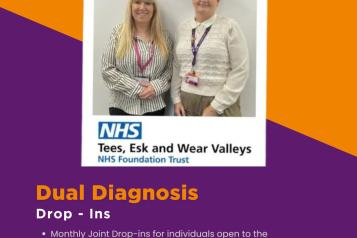Mental health nurses to work in GP surgeries across Teesside

The pilot, held from October 2020 to March 2021, saw two mental health nurses from local NHS mental health and learning disability services provider Tees, Esk and Wear Valleys NHS Foundation Trust (TEWV) work in collaboration with 31 rural and urban GP surgeries in Teesside.
Under the pilot, patients contacting their GP surgery with mental health concerns were offered an appointment – face-to-face, by telephone or online – directly with a mental health nurse. The nurse provided early support through a brief assessment, signposting patients to the right service for their needs, and providing interventions where needed.
In the first three months of the pilot, 670 appointments were held with 483 patients. Of these, only 19 patients were referred on to more in-depth mental health support from TEWV. A review of patients referred by GPs to TEWV services resulted in some patients being brought back into the care of their local GP surgery with the support of the local mental health nurse.
Following the learning from the pilot, a new service is now being set up across most of Teesside, part funded by the PCNs and TEWV, and will see a mental health nurse working as part of the general practice team.
The move is part of a nationwide NHS England PCN additional roles reimbursement scheme designed to support new GP services and to create additional capacity in general practice.
Plans and funding are in place to further increase the number of mental health nurses in PCNs across Teesside in the coming years, with additional PCNs expected to join the mental health scheme as the programme develops.
The move is one of the first phases of work under the Community Mental Health Framework, which will develop and transform local community mental health support to give people greater choice and control over their care and support them to live well in their communities.
The aim is to improve the quality of care for people struggling with mental health difficulties by giving rapid access to specialist mental health advice in their local GP surgery, and direct patients to the right place first time round. In many surgeries, this will mean patients do not have to see a GP first to go through a referral process for example, and so do not have to ‘tell their story’ twice which can be difficult for many people.
Where mental health nurses are non-medical prescribers (health professionals other than a doctor or dentist able to prescribe medication), they will also review patients’ long term medications and reduce or stop these where appropriate. The support of mental health nurses also offers patients empowerment to develop coping strategies and resilience.
Laura Cattermole, mental health practitioners in primary care networks (Teesside) programme lead, TEWV, said “Having mental health nurses available as part of the GP surgery team just makes sense – mental and physical health can be very interlinked.
“Many people contact their GP with mental health concerns including anxiety, low mood, hearing voices, depression and concerns following life events such as bereavements and relationship breakdowns. Through the pilot, the GP surgeries have been able to make sure patients get the support they need much quicker.
“For many patients, a chat with the mental health nurse can point them in the right direction of self-help resources to build coping strategies and resilience. For others, it might be signposting to the right service to support their needs or, for some, where needed, the nurses can offer interventions and medication reviews.”
As part of the pilot, the mental health nurses were able to update a patient’s GP surgery records meaning GPs had instant access to appointment outcomes and next steps. The mental health experts also provided support to GP surgery reception teams to help staff direct patients to mental health appointments.
Laura added “The nurses are also on hand to provide advice and guidance to GP surgery staff including supporting reception teams for example to correctly direct patients to mental health appointments.”
“GPs have told us the pilot has helped their patients and that they are pleased to have the expertise of a trained mental health nurse in their surgery.
“Patients too have told us the service is helpful to them. On patient told us their problem was ‘almost resolved immediately in a simple but highly practical and helpful 20 minute telephone consultation’ and another told us ‘I was listened to and the medication is working well, still early days but I feel so much better’.”
Dr Jen Standen, GP Partner and Practice PCN Clinical Lead, Parkway Medical Centre, Social Prescribing Lead Greater Middlesbrough PCN and Clinical lead Middlesbrough IRIS Programme, said “Having a mental health nurse as part of our general practice team has been fantastic. Our patients really value the care and additional support she provides, and they often tell me how much her input has helped and supported their recovery journey.
“It has been great working together with TEWV to help support patients to access the right care, in the right place sooner.”
Dr Kate Harvie, Senior Partner, Hillside Practice, Skelton, said “I was very excited to hear about the mental health pilot in practices when it was first mentioned, and was keen to have this take place in my own practice at Hillside in Skelton.
“We were fortunate to have a mental health practitioner with us during the pilot for one day a week for just over three months. Patients were able to book an appointment directly with her and she was also available to the GPs to ask for advice.
"As well as being highly appreciated by patients, this was helpful if GPs were considering a referral, because the mental health practitioner would be able to assess the patients really quickly and often provide the same kind of advice that patients would have had after a referral and a wait to be seen in an unfamiliar location.
“I am really pleased that after the completion of the pilot this is going to be made into a permanent arrangement.”


